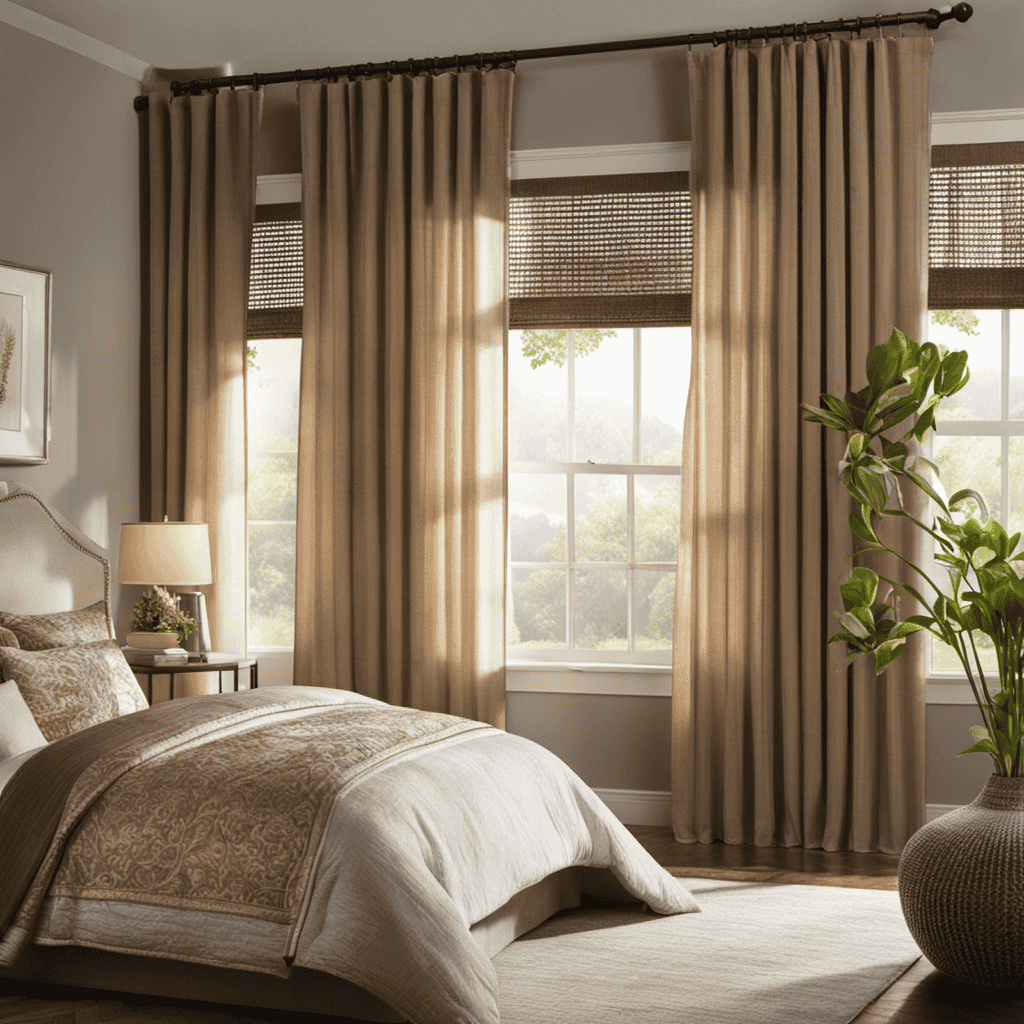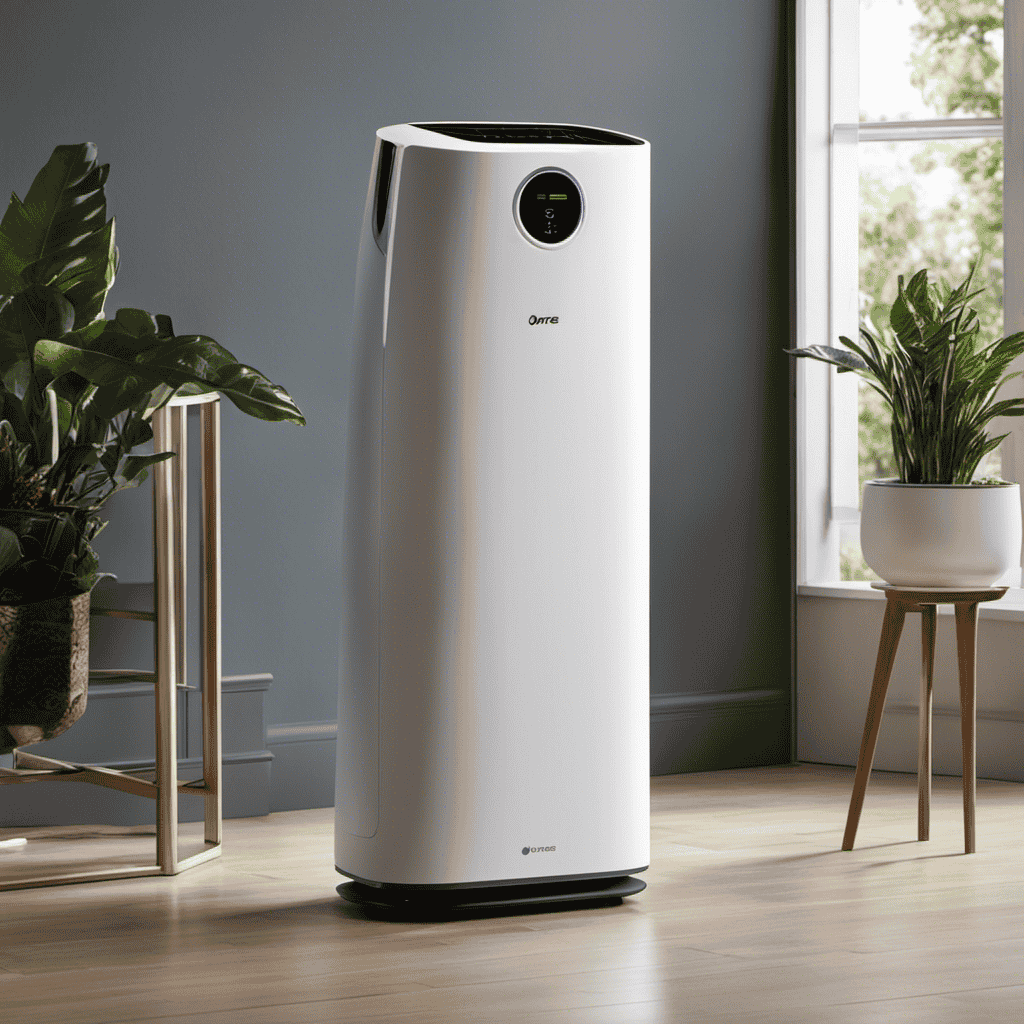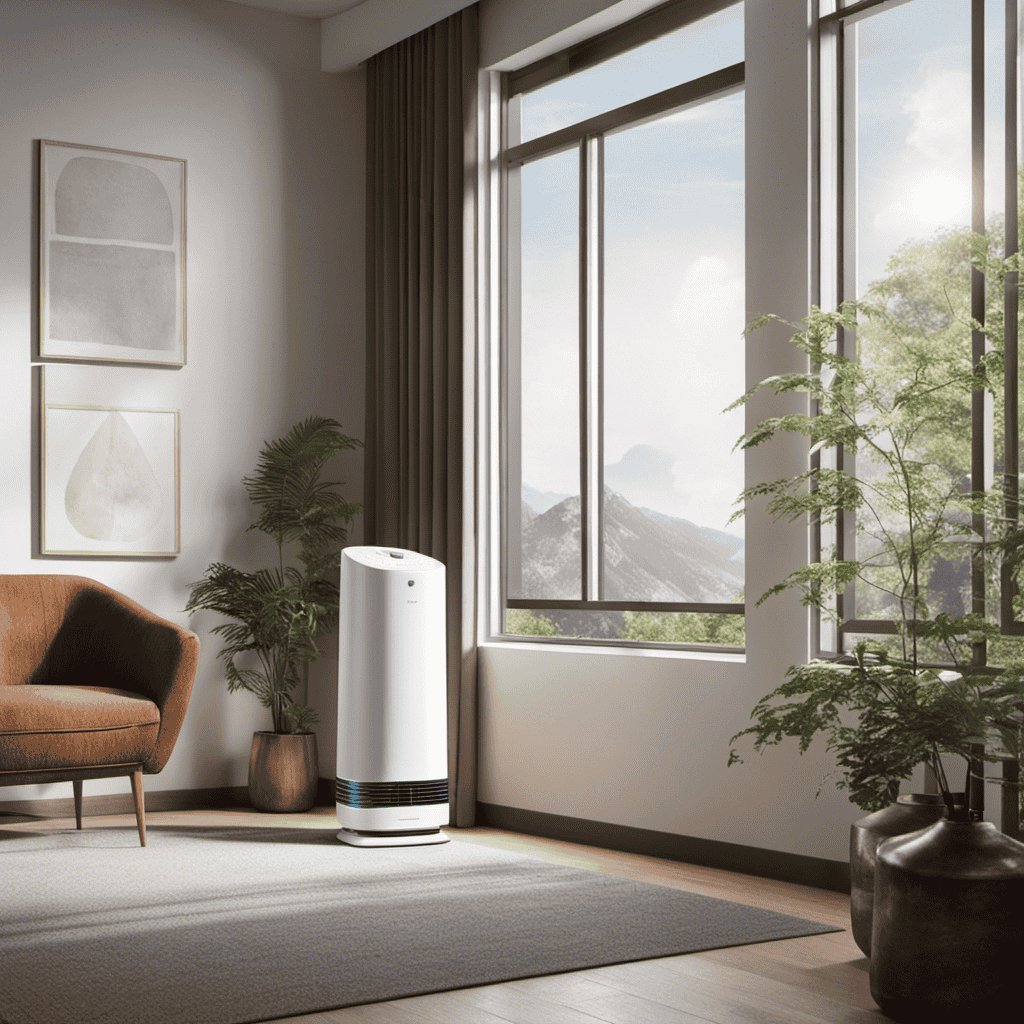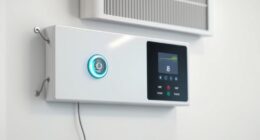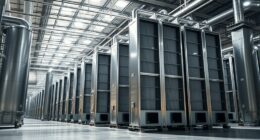I’ve finally discovered the solution to the timeless debate: ionizer vs. air purifier. Get ready, because the answer may surprise you.
In this article, I will dive deep into the world of ionizers and air purifiers, exploring the science behind them and weighing the pros and cons. By the end, you’ll have all the evidence-based information you need to make an informed decision.
So, let’s get ready to clear the air and find out which one reigns supreme!
Key Takeaways
- Ionizers release negatively charged ions into the air to make particles fall or stick to surfaces, while air purifiers use filters to capture and remove pollutants from the air.
- Some ionizers produce ozone, which can be harmful in high concentrations, whereas filterless air purifiers utilize technologies like electrostatic precipitation or UV-C light.
- Air purifiers are generally considered more effective in removing a wider range of pollutants and reducing the risk of respiratory problems and allergies by removing allergens and irritants from the air.
- Air purifiers have longer-lasting filters that only need to be replaced every 6-12 months, making them more cost-effective and efficient in providing clean and healthy indoor air in the long term.
Understanding the Basics: Ionizers and Air Purifiers
Ionizers and air purifiers are two popular options for improving indoor air quality.
When it comes to ionizers, they work by releasing negatively charged ions into the air, which attach to airborne particles, causing them to fall to the ground or stick to surfaces.
On the other hand, air purifiers use filters to capture and remove pollutants from the air.
One important consideration is that some ionizers release ozone as a byproduct, which can be harmful in high concentrations. However, not all ionizers produce ozone, so it’s crucial to check the specifications before purchasing.
In terms of filterless air purifiers, they utilize various technologies like electrostatic precipitation or UV-C light to capture or neutralize pollutants.
Ultimately, the choice between ionizers and air purifiers depends on individual needs and preferences, as well as the specific features and technologies offered by different models.
The Science Behind Ionizers and Air Purifiers
When it comes to choosing between an ionizer and an air purifier, it’s important to understand the key differences.
Ionizers work by releasing negative ions into the air, which attach to particles and make them heavier, causing them to fall out of the air.
Air purifiers, on the other hand, use various filters to trap and remove particles from the air.
Both options have their own efficacy and it’s important to consider factors such as the size of the room and the specific pollutants you’re trying to address.
While ionizers may have some benefits in terms of improving air quality, air purifiers are generally considered more effective in removing a wider range of pollutants.
In terms of health benefits, air purifiers have been shown to reduce the risk of respiratory problems and allergies by removing allergens and irritants from the air.
Ionizer Vs. Air Purifier
Air purifiers are widely recommended by experts for their ability to remove airborne pollutants.
When it comes to understanding the differences between ionizers and air purifiers, it’s important to consider several factors, including cost. Ionizers are generally cheaper upfront compared to air purifiers, which tend to be more expensive.
However, it’s important to note that air purifiers often have additional features, such as filters that can capture smaller particles and remove odors, making them more effective in improving indoor air quality.
Additionally, air purifiers typically have longer-lasting filters that only need to be replaced every 6-12 months, whereas ionizers require regular maintenance and cleaning.
While the initial cost of an ionizer may seem attractive, it’s important to consider the long-term benefits and effectiveness of an air purifier in providing clean and healthy indoor air.
Efficacy of Ionizers
To effectively gauge the performance of ionizers, you should consider factors like their ability to reduce airborne pollutants and improve indoor air quality. When assessing the effectiveness of ionizers, it is important to keep in mind their impact on allergies. Here are three key points to consider:
-
Reduction of airborne pollutants: Ionizers work by releasing negative ions into the air, which attach themselves to positively charged particles such as dust, pollen, and pet dander. This process causes these particles to become heavy and settle, effectively reducing their presence in the air.
-
Neutralization of allergens: By attracting and neutralizing allergens, ionizers can potentially provide relief for allergy sufferers. The negative ions released by ionizers can attach themselves to allergens like pollen and mold spores, rendering them harmless.
-
Improvement in indoor air quality: Ionizers can help improve overall indoor air quality by reducing the concentration of harmful pollutants. This can be particularly beneficial for individuals with allergies, as it can alleviate symptoms and create a healthier living environment.
While ionizers have shown promise in reducing airborne pollutants and improving indoor air quality, it is important to note that their effectiveness may vary depending on factors such as room size, ionizer capacity, and individual sensitivity to allergens.
Health Benefits of Purifiers
By reducing airborne pollutants, purifiers can help improve overall indoor air quality and create a healthier living environment. Air purifiers have been found to be beneficial for individuals with allergies and respiratory conditions. They work by trapping and removing allergens such as pollen, dust mites, pet dander, and mold spores from the air. This can significantly reduce the symptoms associated with allergies, such as sneezing, coughing, and wheezing. For individuals with respiratory conditions like asthma, air purifiers can help by removing irritants that can trigger asthma attacks, such as smoke particles and volatile organic compounds (VOCs). The table below highlights some of the key health benefits of using air purifiers for allergies and respiratory conditions:
| Health Benefits | Air Purifiers Can Help With |
|---|---|
| Reducing allergy symptoms | Pollen, dust mites, pet dander |
| Preventing asthma triggers | Smoke particles, VOCs |
| Improving overall respiratory health | Mold spores, bacteria, viruses |
It is important to note that while air purifiers can help improve indoor air quality, they are not a substitute for other preventive measures such as regular cleaning, proper ventilation, and maintaining a smoke-free environment.
Pros and Cons of Ionizers
One of the pros of using ionizers is that they can help remove allergens from the air. This can be particularly beneficial for individuals with allergies or respiratory conditions.
However, it is important to consider the controversy surrounding ionizers and their safety.
Here are three key points to consider:
-
Ozone emissions: One concern with ionizers is the potential release of ozone, a harmful gas. Some studies have shown that certain types of ionizers can produce high levels of ozone, which can be detrimental to human health.
-
Limited effectiveness: While ionizers can remove certain particulate matter from the air, they may not be as effective as air purifiers in eliminating other pollutants like smoke or volatile organic compounds (VOCs).
-
Maintenance requirements: Ionizers require regular cleaning and maintenance to ensure optimal performance. Neglecting these tasks can lead to a decrease in their effectiveness over time.
It is important to weigh the pros and cons of ionizers and consider alternative air purification methods to ensure the safety and effectiveness of indoor air quality improvement.
Pros and Cons of Air Purifiers
Consider the maintenance requirements of air purifiers to ensure they continue to effectively remove pollutants from the air. Air purifiers are a popular choice for improving indoor air quality, but it’s important to understand the pros and cons before making a purchase. Here is a table comparing three common air purifier technologies and their maintenance needs:
| Technology | Maintenance Requirements |
|---|---|
| HEPA Filters | Regular filter replacement |
| Activated Carbon Filters | Regular filter replacement |
| UV-C Light | Occasional bulb replacement |
HEPA filters and activated carbon filters need to be replaced regularly to maintain their effectiveness. UV-C light technology requires occasional bulb replacement to ensure continuous air purification. Proper maintenance is crucial for optimal performance and longevity of air purifiers. Regularly cleaning or replacing filters and bulbs is essential to keep pollutants and allergens at bay.
In the next section, we will compare the effectiveness of ionizers and air purifiers in purifying the air.
Which Is More Effective: Ionizers or Air Purifiers
Maintaining proper maintenance is crucial for optimal performance and longevity of both ionizers and air purifiers. When it comes to the effectiveness of ionizers versus air purifiers, there are several factors to consider.
-
Ionizer benefits: Ionizers work by releasing negative ions into the air, which attach to airborne particles and cause them to fall to the ground. This can be beneficial for removing certain types of pollutants, such as dust and allergens.
-
Air purifier technology: Air purifiers use a combination of filters to capture and remove harmful particles from the air. HEPA filters, for example, can effectively remove airborne pollutants, including allergens, bacteria, and viruses.
-
Effectiveness: While ionizers may be effective at removing certain types of particles, air purifiers with HEPA filters are generally considered more effective at removing a wider range of pollutants from the air. HEPA filters can trap particles as small as 0.3 microns, making them highly efficient at improving indoor air quality.
Factors to Consider When Choosing Between an Ionizer and an Air Purifier
When considering the effectiveness of ionizers and the health benefits of air purifiers, there are several key points to consider.
Firstly, it is important to understand that ionizers work by releasing negatively charged ions into the air, which attach to particles and cause them to fall out of the air. However, studies have shown that ionizers may not be as effective as air purifiers in removing harmful pollutants such as allergens, smoke, and mold spores.
Secondly, air purifiers use a combination of filters to trap and remove these pollutants from the air, providing cleaner and healthier air to breathe.
Lastly, the health benefits of using air purifiers include reducing allergy symptoms, improving respiratory health, and creating a cleaner environment overall.
Effectiveness of Ionizers
The effectiveness of ionizers is often debated among experts. When comparing the effectiveness of ionizers to other air purifiers, research studies have provided valuable insights.
Here are three key findings from these studies:
-
Particle Removal: Some research suggests that ionizers can effectively remove airborne particles, including allergens and pollutants. However, it is important to note that the effectiveness may vary depending on the specific model and the size of the particles.
-
Ozone Production: One concern with ionizers is the potential for ozone production. Research indicates that certain ionizers may produce ozone as a byproduct, which can be harmful to human health. It is crucial to choose an ionizer that meets safety standards and has low or no ozone emission.
-
Overall Performance: Research comparing the effectiveness of ionizers to air purifiers with filters has shown mixed results. While some studies have found ionizers to be effective in reducing certain pollutants, others have shown that air purifiers with filters are more efficient in capturing a broader range of contaminants.
Health Benefits of Purifiers
After exploring the effectiveness of ionizers, let’s now delve into the health benefits of air purifiers. When it comes to improving indoor air quality, air purifiers have proven to be highly beneficial. They are designed to remove harmful particles, such as dust, pollen, pet dander, and mold spores, from the air we breathe. This can greatly reduce the risk of respiratory issues and allergies, leading to better overall health.
To better understand the benefits of air purifiers, let’s compare their features with ionizers in the following table:
| Air Purifiers | Ionizers |
|---|---|
| Removes harmful particles | Releases negative ions |
| Traps pollutants in filters | Causes particles to stick to surfaces |
| Can improve overall air quality | May create ozone as a byproduct |
As you can see, air purifiers offer a wider range of benefits compared to ionizers. They effectively capture and remove pollutants from the air, helping us breathe cleaner and healthier air.
Tips for Maintaining and Maximizing the Performance of Ionizers and Air Purifiers
To keep your ionizer or air purifier running efficiently, make sure to regularly clean the filters and replace them as needed. Here are three tips for maintaining and maximizing the performance of your ionizer or air purifier:
-
Clean the filters: Dust, pollen, and other particles can accumulate on the filters over time, reducing their effectiveness. Regularly clean the filters by gently vacuuming or rinsing them with water. Let them completely dry before reinserting them.
-
Replace the filters: Filters have a limited lifespan and need to be replaced periodically. Check the manufacturer’s instructions for the recommended replacement schedule. It’s important to replace filters promptly to ensure optimal performance.
-
Monitor energy consumption: If energy efficiency is a concern, consider comparing the energy consumption of ionizers and air purifiers before making a purchase. Some ionizers use less energy than air purifiers, making them a more energy-efficient option.
Frequently Asked Questions
Can Ionizers or Air Purifiers Completely Eliminate All Types of Pollutants in the Air?
Ionizers and air purifiers can both help reduce pollutants in the air, but neither can completely eliminate all types. Long-term health effects vary, so it’s important to research and choose the option that suits your needs and concerns.
Do Ionizers or Air Purifiers Produce Any Harmful Byproducts During the Purification Process?
During the purification process, both ionizers and air purifiers can produce harmful byproducts. It is important to consider their environmental impact and cost effectiveness when deciding which one is better.
Can Ionizers or Air Purifiers Be Harmful to Individuals With Respiratory Conditions, Such as Asthma or Allergies?
In my opinion, both ionizers and air purifiers can be harmful to individuals with respiratory conditions like asthma or allergies. It’s important to consider the effectiveness and comparison of these devices in reducing airborne pollutants and improving indoor air quality.
Do Ionizers or Air Purifiers Require Any Special Maintenance or Cleaning?
Special maintenance and cleaning requirements vary between ionizers and air purifiers. It’s important to follow the manufacturer’s instructions for proper upkeep. Regular cleaning of filters and periodic maintenance are typically necessary to ensure optimal performance and longevity.
Can Ionizers or Air Purifiers Remove Odors and Eliminate Cooking or Pet Smells From the Air?
Yes, ionizers and air purifiers can remove odors and eliminate cooking or pet smells from the air. However, when it comes to effectiveness in removing cigarette smoke and reducing indoor air pollutants, a comparison between ionizers and air purifiers is necessary.
Is an Ionizer or Air Purifier More Effective at Reducing Noise in a Honeywell Air Purifier?
When it comes to reducing noise in a quiet Honeywell air purifier, an ionizer or air purifier can both be effective options. However, many users find that an air purifier with a HEPA filter is more effective at reducing noise while still providing excellent air purification.
Conclusion
After carefully examining the evidence and considering all the factors, it is clear that both ionizers and air purifiers have their advantages and disadvantages.
While ionizers may have some benefits in terms of neutralizing certain pollutants, air purifiers offer a more comprehensive and effective solution for improving indoor air quality.
Ultimately, the choice between the two depends on individual needs and preferences. It is important to weigh the pros and cons, and consider factors such as budget, room size, and specific air quality concerns before making a decision.
Regular maintenance and proper usage are key to maximizing the performance of either option.

